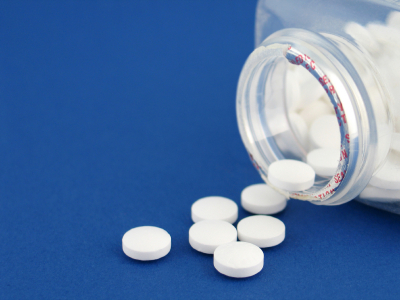Danish Population-Based Study Identifies New Drug Candidates for Bipolar Disorder

At the 2020 meeting of the International Society for Bipolar Disorders, Lars Kessing of the Psychiatric Center Copenhagen described a study that examined incidence of bipolar disorder among a total of 1,605,365 participants who purchased one of six common medications over a ten-year-period, with the goal of identifying drugs that might be repurposed to prevent or treat bipolar illness. The drugs were non-aspirin nonsteroidal anti-inflammatory drugs (NSAIDs such as ibuprofen), low-dose aspirin, high-dose aspirin, statins, allopurinol, and angiotensin.
Because Denmark has population-based healthcare data, the researchers were able to identify participants who purchased these medications between 2005 and 2015, and could also assess these participants for two outcome measures: 1) whether they had received a diagnosis of mania or bipolar disorder as an inpatient or outpatient at a psychiatric hospital, and 2) a combined measure of whether they had received a diagnosis for mania or bipolar disorder in any setting or initiated lithium use. The data on these participants were compared to a random sample of 30% of the population of Demark.
Kessing and colleagues found that among those with steady use of low-dose aspirin, statins (used to lower blood cholesterol), and angiotensin agents (which can lower blood pressure), there was a significant decreased incidence of mania/bipolar disorder on both outcome measures.
In contrast, among those taking non-aspirin NSAIDs and high-dose aspirin, there was an increased incidence of bipolar disorder. (There were no statistically significant findings with regard to allopurinol, which is used to treat gout and kidney stones.)
The researchers concluded that population-based studies such as these can be used to identify drugs that may have secondary benefits, in this case low-dose aspirin, statins, and angiotensin agents, which have already been identified as potentially therapeutic in other research.
Meta-Analysis Shows Anti-Inflammatory Treatments Improve Bipolar Depression
 It has been clear for some time that depression and inflammation are linked. This has led researchers to explore a variety of anti-inflammatory agents to treat depression. A meta-analysis of studies examining anti-inflammatory treatments for bipolar depression was published in the journal Bipolar Disorders in 2016.
It has been clear for some time that depression and inflammation are linked. This has led researchers to explore a variety of anti-inflammatory agents to treat depression. A meta-analysis of studies examining anti-inflammatory treatments for bipolar depression was published in the journal Bipolar Disorders in 2016.
Researcher Joshua D. Rosenblat and colleagues identified eight randomized controlled trials that met their criteria for anti-inflammatory treatments of bipolar disorder. These treatments included nonsteroidal anti-inflammatory drugs (NSAIDs such as ibuprofen and aspirin), omega-3 fatty acids, the antioxidant N-acetylcysteine, and pioglitazone (used to treat diabetes). Overall, the anti-inflammatory treatments had a moderate and statistically significant antidepressant effects. No serious side effects were reported, and the anti-inflammatory treatments did not cause a switch into mania in any of the participants.
The diversity of the anti-inflammatory treatments reviewed in this meta-analysis limit the extent to which it can be interpreted, but it is clear that more research on anti-inflammatory treatments for bipolar depression is needed. An open question is whether patients with particularly elevated levels of inflammatory markers in their blood would respond better to these anti-inflammatory treatments.
Anti-Inflammatory Treatments Look Promising for Bipolar Depression
Inflammation has been linked to both unipolar and bipolar depression. New research shows that anti-inflammatory treatments may reduce bipolar depression, for which few treatments exist.
Researchers led by Jonathan Savitz divided people with bipolar depression into four groups. One group received two placebos, another received minocycline (a drug with neuroprotective and immune-modulating properties) plus a placebo, the third received aspirin plus a placebo, and the final group received both minocycline and aspirin. Of the 64 participants, those who took both minocycline and aspirin were most likely to respond to treatment and to enter remission. In people with body mass indexes (BMIs) above the median of 30, a sign of greater inflammation, 100% of those who received both anti-inflammatory drugs responded to treatment, compared to 36% of those who received aspirin alone, 33% of those who received minocycline alone, and 25% of those who received two placebos.
Dosages of the drugs were 100mg twice a day for minocycline and 81mg twice a day for aspirin. Savitz and colleagues believe that aspirin and minocycline must work particularly well together, and are modifying their study to more directly compare use of the two anti-inflammatory drugs together to the absence of anti-inflammatory treatments.
Aspirin added to Regular Treatment Reduces Symptoms of Schizophrenia
Most drugs used to treat schizophrenia target dopamine and serotonin receptors in the brain. While these are effective in many patients, relapse is common and side effects can be severe. Researchers are looking for ways to target other mechanisms that cause schizophrenia, and inflammation seems to be one of these. There is evidence that a treatment as simple as aspirin, when added to regular treatment with antipsychotics, can improve schizophrenia by targeting inflammation.
In a 2010 study by Laan et al. published in the Journal of Clinical Psychiatry, patients with moderate or severe schizophrenia were given either placebo or aspirin (acetylsalicylic acid, 1000mg) in addition to their regular treatments every day for three months. The patients who received aspirin showed a significant reduction in the positive symptoms of schizophrenia, and to a lesser extent the negative symptoms, compared to those who received placebo. Cognitive function was not improved. The effect size (Cohen d) for the total scale score was 0.5, which is considered a “medium” effect and one that is clinically relevant.
The reductions in symptoms were greater in those patients who had more altered immune function.
Aspirin May Help Reduce Schizophrenia Symptoms
An article by Laan et al. published in the Journal of Clinical Psychiatry in 2010 suggested that aspirin may reduce symptoms of schizophrenia spetrum disorders in patients being treated with antipsychotics.
Aspirin is an anti-inflammatory drug. We’ve written before about the possible use of aspirin in bipolar disorder and about the role of inflammation in mental illness.
Aspirin for Bipolar Patients?
Bipolar patients treated with acetylsalicylic acid (aspirin) in conjunction with lithium prophylaxis needed fewer other adjunctive treatments, compared to patients treated with lithium alone, reports Stanley Rapoport of the National Institutes of Health. These retrospective epidemiological data are of considerable interest in relationship to evidence of an inflammatory component in the affective disorders, as reviewed in Vol. 13(2), 2009 of the BNN, but because the data is preliminary, more study is required.
EDITOR’S NOTE: Several measures of inflammation are higher in children and adults with bipolar disorder compared with controls. These include the ratio of inflammatory to anti-inflammatory cytokines, higher levels of TNF-alpha, and the inflammatory marker c-reactive protein. These peripheral markers measured in blood have been confirmed with direct measurements in postmortem brain autopsy specimens of people who had a history of bipolar disorder.
It is unclear how this information about inflammation in bipolar disorder may eventually inform treatment. In past BNNs, we have noted the positive effects of the anti-inflammatory antibiotic minocycline on schizophrenia, and stressed the need for studies of this compound in bipolar disorder. TNF-alpha inhibitors have also been associated with improvement in depression when used in the treatment of patients with rheumatoid arthritis and other autoimmune disorders.




